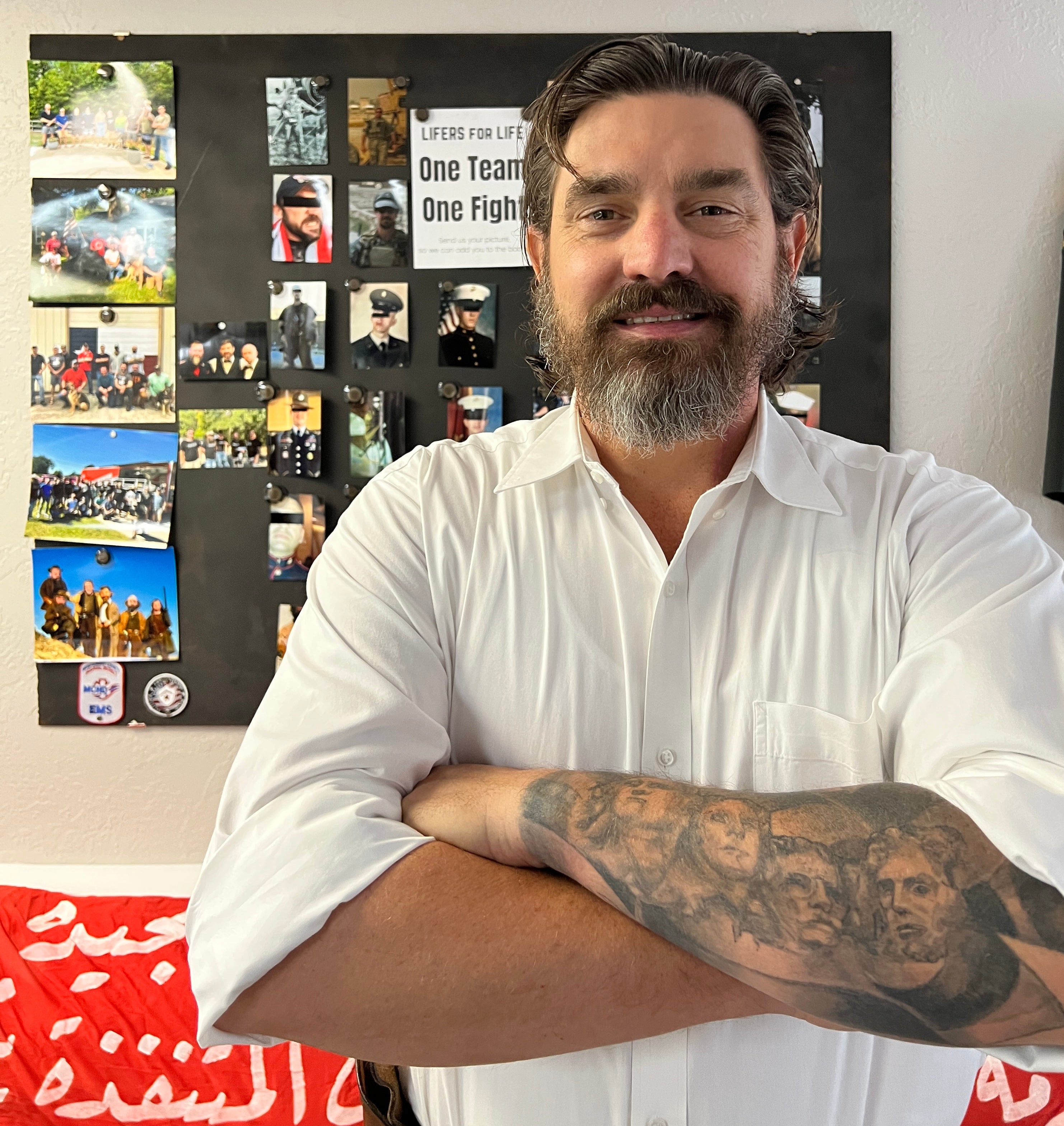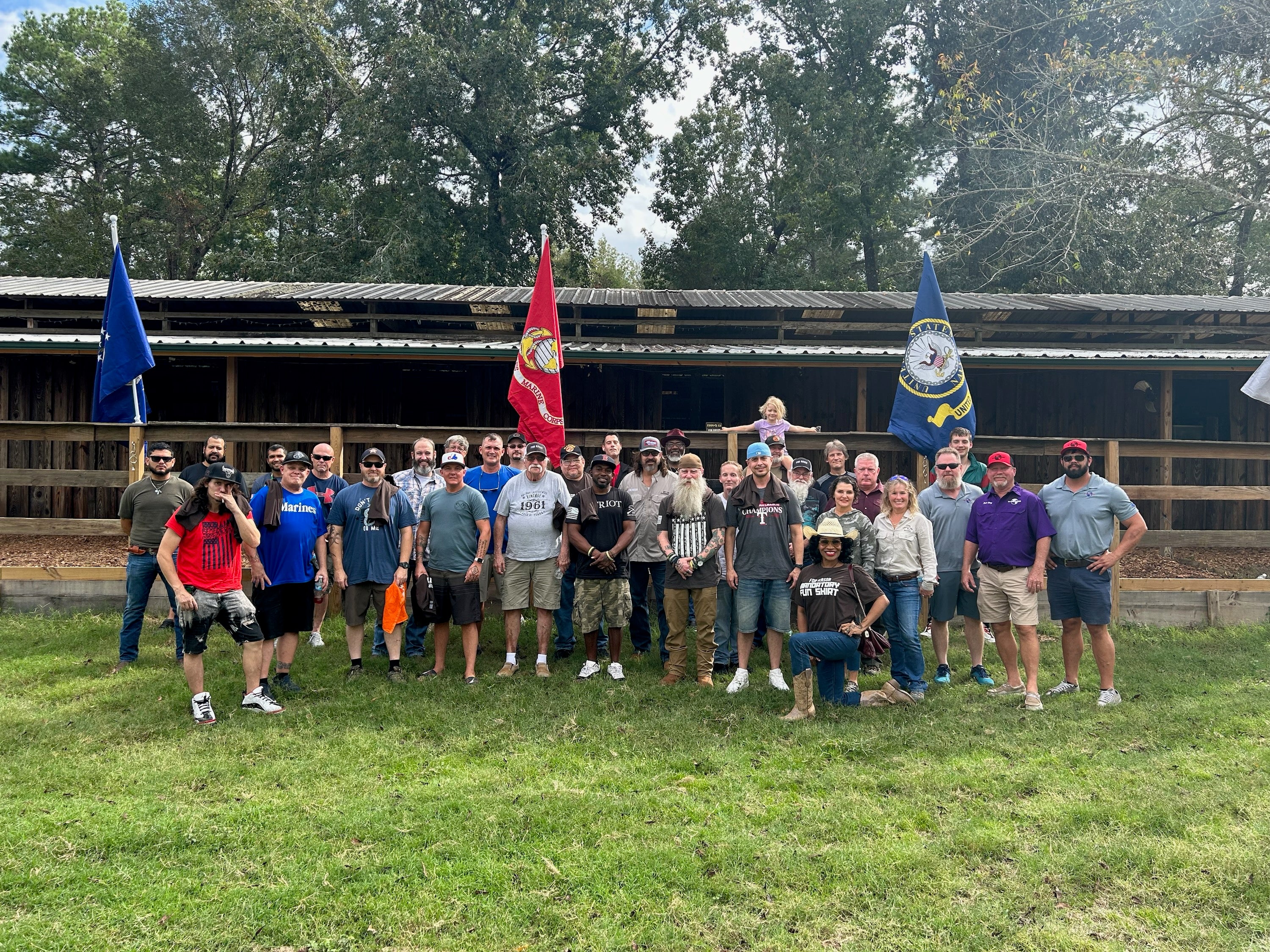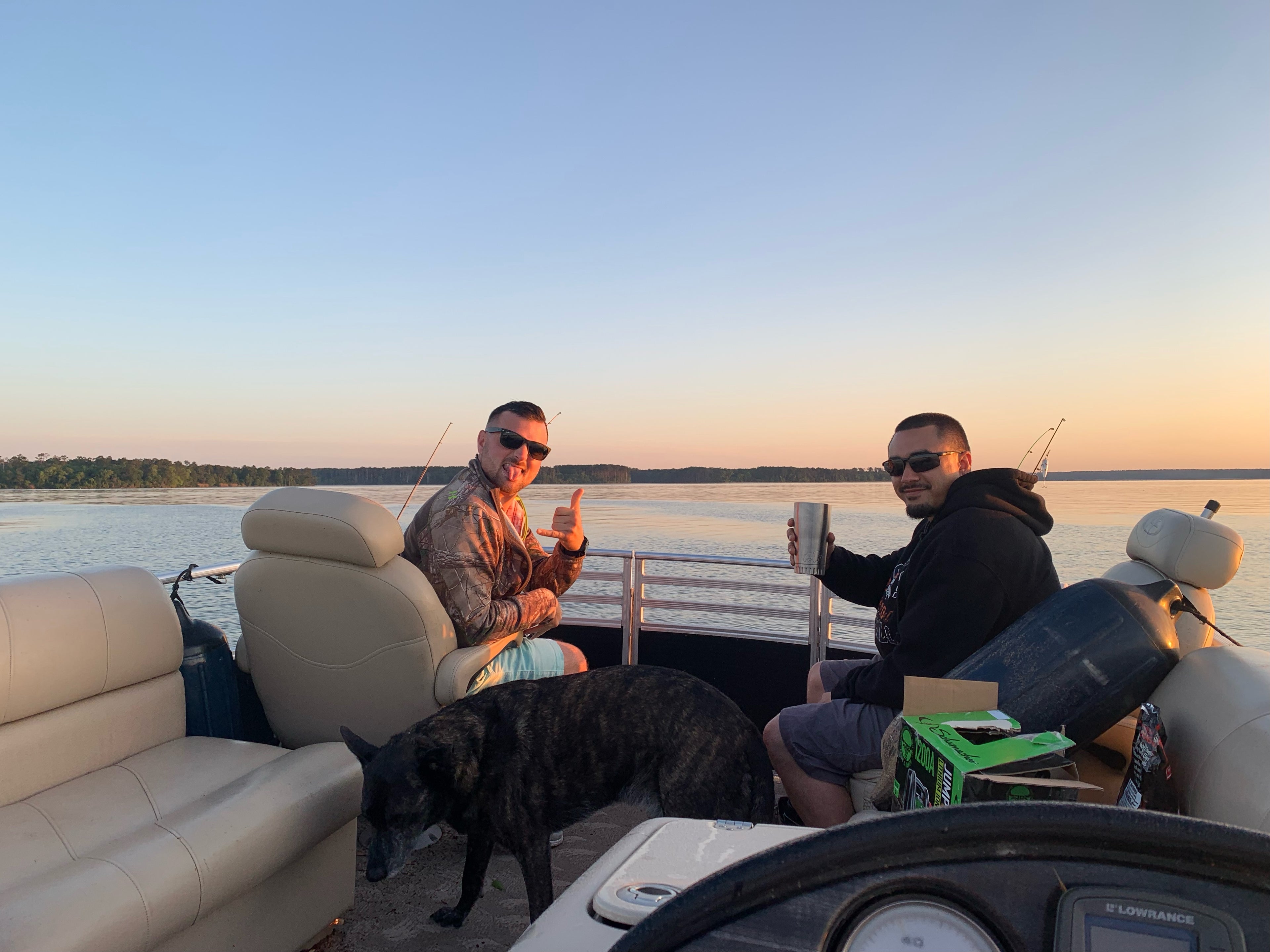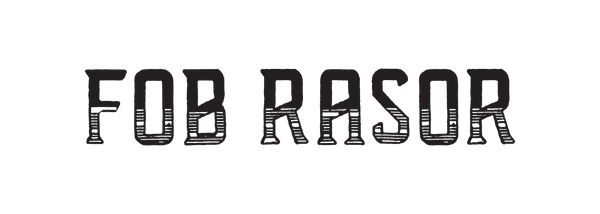Our Mission
FOB Rasor is dedicated to suicide prevention and the mental well health of our veterans and first responders who have PTSD, alcohol/drug addiction, suicidal
thoughts, and/or other mental health ailments.
In the USA 22 veterans die by suicide every day. Our focus is peer guided support
for long term mental health recovery.

-
Why we do what we do
Read MoreOn April 21, 2017 my best friend and Brother-in-Arms, Sergeant Joe Rasor died by suicide. At the time, I was six months sober and 5 months removed from an in-patient rehab program for alcoholism, PTSD and contemplating my own suicide.
-
Who we serve
Read MoreAren't sure where to go or if you belong? If you are a veteran or first responder hurting or doing well, you belong here.
If you are a veteran or first responder, you belong here.
If you are looking for a non-medical model that works, you belong here.
-
Our method
For those who are ready for structured help, we provide a veteran lead platform (in person & virtual) for warriors dealing with depression, mental health issues, PTSD, and suicidal thoughts. We teach veterans how to support one
another through kneecap to kneecap honest, discussions using a structured 12 Step Course of Action. This is a program of action for Vets to help Vets. Meetings are no cost to attend.

What's next
If you are ready for help, call or text Gunny at 281-573-7250 to learn more.

Learn more
If you aren't sure about attending a meeting or are just curious (mental health professionals, donors, etc.) about FOB Rasor meetings we will be happy to answer any questions you have. Our meetings are for Lifers seeking help, so please respect their privacy by not attending the Lifer meetings. To learn more, please schedule an informational meeting with Gunny Ski via email or phone

This program is supported by a grant from the Texas Veterans Commission Fund for Veterans’ Assistance. The Fund for Veterans’ Assistance provides grants to organizations serving veterans and their families. For more information, visit www.tvc.texas.gov.
Ways to help
For family & friends
Emergency suicide numbers
988 Suicide Prevention Hotline. Call or Text.
Camp Hope PTSD Veteran Line: (877) 717-PTSD (7873)
Suicide Prevention Line Call 1-800-273-8255
Know the risk factors and warning signs
Suicide is a permanent solution to a temporary problem or feeling. At FOB Rasor, we want to intervene before the risk factors and behaviors escalate. Staying connected with Vets and First Responders with shared experiences can reduce escalation and improve mental health wellness.
What causes our Vets and First Responders to kill themselves?
There is no single cause for suicide amongst our Nations Heroes, but the feeling of hopelessness and despair is a certainly a commonality amongst those at risk. Depression is the common condition involving those who kill themselves. When our Heroes face unaddressed depression, anxiety, and substance abuse, the risk of one of these Gladiators killing themselves is elevated. Most of the Warriors that actively manage their conditions not only continue to march, but commonly develop a certain motivation for life that they previously could not see.
What are the risk factors found in our nation’s Heroes?
Untreated Post Traumatic Stress (PTS) can be an absolute hell to deal with. Nightmares, anxiety, depression, and being on high alert or the constantly scanning of threats is exhausting. The Warrior with PTS, may create emotional distance from their closest friends and family. Personality traits of aggression, mood swings and emotional outbursts are often associated with PTS.
Chronic pain and/or Traumatic Brain Injury (TBI) are commonly experienced by our Combat Veterans. The constant feelings associated with these ailments can become overwhelming and leave one with a feeling of hopelessness.
Drug and alcohol abuse are often used as means of self-medication. The Warrior often becomes physically and mentally addicted in his or her efforts numb themselves from PTS, TBI and the physical pains they endure.
Are there some warning signs?
Yes, in many of the previous incidents involving our nation's heroes there is a change in behavior. If a new or changed behavior is correlated with a painful event, loss or change, we ought to be concerned.
If a Veteran or First responder begins to talk of killing themselves, hopelessness, being a burden, trapped or in unbearable pain he or she should be considered as someone in terrible need of help.
Certain behaviors are also considered as red flags. Increased drug and or alcohol are often ways of trying to self medicate. Withdrawing from previously enjoyed activities, isolating, sleeping entirely too much, giving away prized possessions, aggression and fatigue are all behaviors that should be considered very relevant.
When someone is considering killing themselves they often display feelings of anxiety, humiliation, shame, and agitation. If someone you know is displaying these types of moods you need to consider these as pertinent issues. If seemingly out of nowhere, the Veteran or First Responder starts displaying relief from these issues you must consider that he or she has made a decision to kill themselves.
What do you do if you have concerns?
You have to talk with them! Find a private location and be absolutely blatant. Ask them, “Are you thinking about or do you plan to kill yourself?” You have to assume that you are the only person that has the intestinal fortitude to reach out and ask. Listen to them! Let them know you care about them. Encourage treatment for them. Do not debate the value of life, minimizing their problems or giving advice.
If they are considering killing themselves you have to take it seriously! Stay with them and take away any lethal means. Call or even text the Suicide and crises line at 988. Again, you have to act like you are the only person that is strong enough to handle this situation. Escort them to mental health services or an emergency room.
For more information please check out the American Foundation for Suicide Prevention.
Adapted from American Foundation for Suicide Prevention.
Become a Supporter | Donate
Suicide Prevention Talk
Talk to your loved one. Talking will not cause suicide. Talking can alleviate suicidal thoughts and put time between thought and action.
Tell them about FOB Rasor Veteran/First Responder support. They are not alone.
Reaching out for help via a call or text is the first step to well mental health. Call or text Gunny Ski at 281-573-7250
If you need an icebreaker, send your loved one the link to this video:
https://youtu.be/Dwi2XF3lEvU
Want to host a meeting?
We can bring a meeting to you. Call to schedule a meeting at your Veteran sober living home/program, VFW, Rehab, etc.

What our Lifers are saying
"I have been a member of FOB Rasor since the doors opened. In my addiction to opiates and untreated PTSD I lost everything that I loved.
With the constant support and mentorship from FOB Rasor I was able to stay sober for 4 years 4 months. I since then established all relationships that were lost due to my addiction and now work for one of the biggest energy companies in the nation. I religiously attend all weekly meetings and mandatory fun events held once a quarter to maintain my constant contact with my unit (FOB RASOR)!!
I am a “Lifer for Life” and will continue to support and be part of this organization for the remainder of my days!!"
B.B. US Navy
FOB Rasor has saved my life. As an active duty soldier I have found it extremely beneficial for my mental health. Not only has it helped me with my alcoholism, but my PTS, anger, and depression. I can finally relate to a group that understands the experiences I have been through and I can count on them to be supportive and just be a listening ear when I need to vent. There is nothing else that has helped me as much as this organization. I’m over a year sober and I am proud when I look into the mirror now. I have FOB Rasor to thank for all it!
S. S. US Army
This is a quote from an author that has written the book Tribe. Battle/War is one of the greatest paradoxes in life. It has the potential to bring out the best and worst in people sometimes even in the same moment. For many years I was fighting a battle against my demons from war and my childhood. I was using any kind of “weapon” to numb myself. Those weapons led to a horrible life that was filled with shame, guilt and suffering. When FOB Rasor found me I instantly felt welcomed and that I had a tribe again. That being said, it still took me ages before I could even begin to imagine looking at my demons. Thankfully I am now with the help of my tribe in FOB Rasor. While I still have those memories and thoughts of shame, guilt, and suffering I have a Tribe that I am able to share it with and we will grow stronger together because of it. I am proud to call myself a Lifer for Life thanks to FOB Rasor.
M.D.


